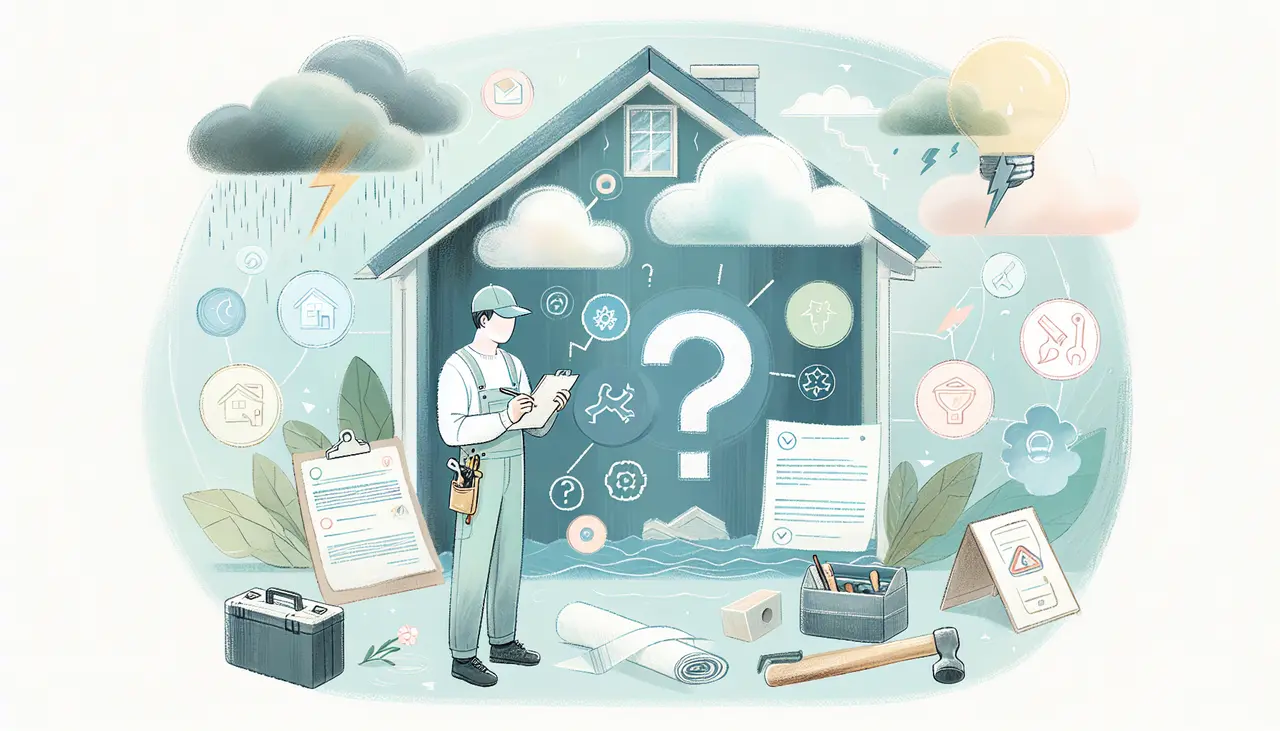Introduction to Storm Repair: What You Need to Know
Storm repair can be a daunting process. It involves inspecting your property for damage, fixing what’s broken, and making sure you’re better protected against future storms. But before you dive in, it’s important to understand the basics. Storm damage can range from minor leaks to major structural damage. And the repair process? It varies. Some issues you might fix swiftly, while others require professional help. Your first step should always be to assess the damage carefully. Look for obvious signs like broken windows or damaged roofs, and don’t miss the less obvious ones, such as water stains on your ceilings that indicate leaks. After evaluation, reaching out to a reputable contractor is key. They can give you an expert’s view on what needs fixing and how to do it. Remember, prompt and effective repairs after a storm not only restore your home but also safeguard it from future damage. Getting clued up on storm repair basics puts you in a stronger position to protect and repair your property when needed.
How to Find the Right Contractor for Storm Repair
Finding the right contractor for storm repair starts with asking the right questions. Don’t just pick the first option that pops up online. Instead, dig a little. A reputable contractor will not mind you vetting them. First, ask for their license and insurance to ensure they’re legit and covered for the work they’ll do on your home. Next, inquire about their experience specifically with storm damage repair. You want someone who knows the ropes, not a newbie who might miss critical issues. Ask for references or before-and-after photos of past projects to gauge their quality of work. Price is also a key topic. Get a detailed quote and ask if there are potential hidden costs or if the initial estimate could change. Remember, cheaper isn’t always better, especially when it comes to repairing storm damage. You’re looking for quality and reliability, not just the lowest price. Finally, ask about the project timeline. You need to know how long the repairs will take, especially if you’re dealing with significant damage. It’s not just about finding someone to do the job; it’s about finding the right someone. With these questions in your toolkit, you stand a better chance of hiring a contractor who won’t just patch things up but restore your peace of mind too.
Key Questions About Contractor’s License and Insurance
Before you let anyone swing a hammer at your storm-damaged property, make sure they are the real deal. Asking about a contractor’s license and insurance isn’t just paperwork talk; it’s your safeguard against hiring a fraud. Every legit contractor should have a current license; this shows they meet the local qualifications to do your job right. Don’t just take their word for it, ask to see it and check it’s valid in your area. Insurance is equally crucial. They should have liability insurance to cover any accidental damages to your property and workers’ compensation insurance in case someone gets hurt on the job. This isn’t just for their protection but yours too. If they’re missing this, you could be on the hook for any mishaps. In short, no license or insurance, no deal. Keep it straightforward and protect your home and wallet.
Experience Matters: Questions About Their Expertise in Storm Repair
When hiring a contractor for storm repair, their experience is key. Ask how long they’ve been fixing storm damage. This tells you if they’re seasoned in dealing not just with the repairs but handling insurance claims too. Do they specialize in roof damage, flooding, or windows? Knowing their area of expertise ensures they’re the right fit for your specific damage. Ask for before and after photos of past projects. This visual proof showcases their skill and the quality you can expect. Check if they’re licensed and insured for storm repair work in your area. This protects you if something goes wrong. Lastly, inquire about warranties on their work. This shows their confidence in fixing your property correctly. Choose wisely; not all contractors have the same level of storm repair expertise.
Understanding the Scope: What Repairs Are Needed?
Before you hire someone to fix the storm damage, you need to grasp fully what needs to be done. Clear communication with your contractor is crucial. Start by asking, “What specific repairs are needed?” This question ensures you both know what work is ahead. It’s about getting down to the nitty-gritty, from roof repair to window replacement or even dealing with water damage. Your contractor should be able to lay it all out for you—what’s urgent, what can wait, and what’s purely cosmetic. Understanding this helps you plan your budget and prioritize what gets fixed first. Don’t shy away from asking for a detailed list. This way, you avoid any surprises and ensure your home gets back in shape efficiently.
Timeframe for Completion: Setting Realistic Expectations
When you’re dealing with storm damage, time is of the essence, but you also want the job done right. It’s key to ask your contractor about how long the repairs will take. Get a clear timeframe from them, not a rough guess. This timeline should include when they’ll start and the projected end date. But, remember, construction can face delays due to unexpected issues or weather. So, while you want a timeline, you also need to be flexible. A good contractor will be upfront about potential delays and keep you in the loop. This way, you can plan your life around the repairs, knowing what to expect and when to expect it. Keep in mind, a faster job isn’t always a better job. Quality takes time, especially if you want repairs that last and keep you safe until the next storm hits.
Cost and Payment: What to Anticipate and How to Prepare
When it comes to repairing storm damage, your pocketbook is likely a major concern. Let’s cut to the chase: costs can vary widely. You’re looking at numbers dependent on the damage extent, materials needed, and the contractor’s rates. Typically, minor repairs might not make a huge dent in your finances, but significant repairs can skyrocket. Prepare to discuss payment plans. Some contractors offer financing or phased payments, especially for big projects. Always ask for a detailed quote upfront. This should cover labor, materials, and any other fees. No surprises, that’s what we aim for. Also, inquire about payment methods accepted and any deposits required. Being upfront now means fewer headaches later. Remember, the goal is getting your home back to shape, not breaking the bank.
Warranty and Guarantees: Ensuring Quality Work
When you’re looking to get storm repair work done, one crucial thing to remember is to talk about warranties and guarantees. Let’s keep it straight: This isn’t just about making sure someone comes back to fix things if they mess up. It’s about ensuring the quality of the work from the start. First, ask your contractor what kind of warranty comes with their work. Most reputable contractors will offer some guarantee on their labor, often for a year or more. This means if something they repaired or installed doesn’t hold up, they’ll come back and fix it, no extra charge. Then, there’s the manufacturer’s warranty on the materials used. This can range widely depending on the type of material and the brand, so make sure you get the specifics. You want to know how long the materials are supposed to last and what’s covered. Cracks, leaks, discoloration? Find out. Also, get it in writing. A handshake might feel solid, but a written guarantee is what will hold up if there’s a problem down the line. Summing up, don’t shy away from getting into the nitty-gritty about warranties and guarantees. It’s not questioning their skill—it’s making sure you’re covered.
Managing the Unexpected: How Changes and Challenges Are Handled
When a storm hits, and damage is done, you can bet the path to repair won’t always be straight. Understanding how your contractor deals with curveballs is crucial. First, ask them straight up about their process for handling surprises like hidden damage or the need for additional work. A good contractor will have a clear plan and be upfront about potential extra costs or time. Find out how flexible they are. Can they adapt on the fly? What about changes in materials or methods if the originally planned ones don’t cut it? Remember, communication is key. Your contractor should keep you in the loop with any changes, including the impact on your bill and schedule. Don’t forget to check how these unforeseen changes might affect any warranties or guarantees on the work performed. Knowing how your contractor tackles these unexpected challenges will give you peace of mind and set realistic expectations for the project’s completion.
Conclusion: Ensuring a Smooth Storm Repair Process
Wrapping up your storm repair shouldn’t be a whirlwind of confusion. To ensure a smooth process, focus on clear communication and understanding every step. Remember, it’s wise to ask about the timeline, the materials used, and the costs upfront. Don’t forget to inquire about warranties and what exactly they cover. Finally, always confirm the cleanup process—no one wants leftover debris around their home. By keeping these points in mind, you can navigate storm repair with confidence, knowing you’ve covered all your bases.







